Scholarly Concentrations at Indiana University School of Medicine offer students the opportunity to deeply engage with a topic of personal interest through coursework and scholarship, complementing their medical education. Students benefit from working with a community of like-minded students, faculty, staff and community members. Through resources and mentorship, they develop expertise and experience that contributes to personal and professional growth and development, and is valuable for residency applications and future goals.
Biomedical Engineering and Applied Medical Technology
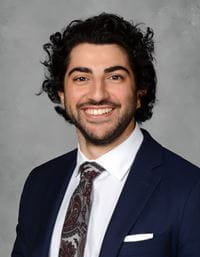
How do you expect your experience in this scholarly concentration to contribute to your career path in medicine?
The BME/AMT Scholarly Concentration not only enriched my medical education but has also equipped me with insights that will undoubtedly influence my approach to patient care and healthcare challenges in my career.
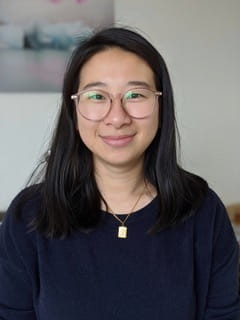 "I definitely think the biomedical engineering scholarly concentration program has helped widen my views. Collaborating with local physicians helps give relatable experiences for my future career."
"I definitely think the biomedical engineering scholarly concentration program has helped widen my views. Collaborating with local physicians helps give relatable experiences for my future career."
Why did you choose the Biomedical Engineering and Applied Medical Technology scholarly concentration?
I’ve had previous experiences in clinical and wet-lab research and wanted to explore this avenue, using my skills and experiences from my undergraduate computer science minor. Having the support from the scholarly concentration has been wonderful—both Dr. Brightman and Dr. Goergen have been very helpful in finding mentors, connecting us with other faculty, and making sure we have the resources and information we need.
How will your participation in this scholarly concentration contribute to your overall career aspirations in medicine?
Doing something in the engineering sphere is different and new to me. I am still unsure
about what the balance of research and clinical work will look like in my future career, but I definitely think the biomedical engineering scholarly concentration program has helped widen my views.
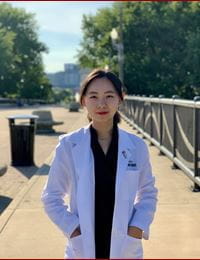 "The Biomedical Engineering and Applied Medical Technology program helps me understand current research for the field of medicine I am interested in."
"The Biomedical Engineering and Applied Medical Technology program helps me understand current research for the field of medicine I am interested in."
How do you expect your experience in this scholarly concentration to contribute to your career path in medicine?
I can see what my physician mentor’s experience is with doing research in clinical practice and determine what type of research I may want to do in my future practice. Additionally, I hope this experience will help me stand out during future residency interviews.
Ethics, Equity, and Justice
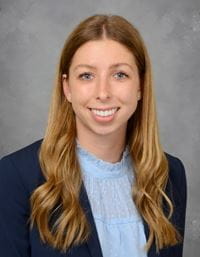
How do you expect your experience in this scholarly concentration to contribute to your career path in medicine?
The Ethics, Equity, and Justice Scholarly Concentration has helped me develop into a justice minded future physician. I was able to further delve into research and make connections in the field of climate health. I will continue to use this knowledge as I begin surgery residency next year. I am grateful for the mentors that the South Bend campus provided me, as well as for the opportunity to explore my interests.
Health Care Integration and Healthy Aging
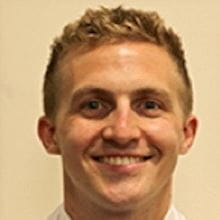 Why did you choose to participate in the Health Integration and Healthy Aging Scholarly Concentration program?
Why did you choose to participate in the Health Integration and Healthy Aging Scholarly Concentration program?
I’m interested in the physical, emotional and psychological changes that occur as people age and how health care systems might improve to optimize well-being throughout the stages of life. Participating in this scholarly concentration will help me become a better member of an interprofessional health care team, as well as gain a stronger understanding of the unique needs of an aging population.
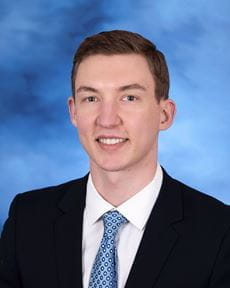 How will your participation in the Health Integration and Healthy Aging Scholarly Concentration contribute to your overall career aspirations in medicine?
How will your participation in the Health Integration and Healthy Aging Scholarly Concentration contribute to your overall career aspirations in medicine?
I was impressed by the diversity of education I received through this program. I initially thought it would revolve around an academic research opportunity, but I quickly discovered that the curriculum was much more comprehensive, with established coursework in public health, didactic components, journal clubs, and other projects along the way that created an interactive, lasting education. My concentration in was diverse enough to truly apply to any field I would wish to pursue. This program has taught me how much of health care occurs out of the office or operating room, and I will carry this knowledge and skillset with me as I advance throughout my career.
Health Promotion and Disease Prevention
How do you expect your experience in this scholarly concentration to contribute to your career path in medicine?
Being part of the Health Promotion and Disease Prevention scholarly concentration program was a highly enriching experience. The opportunity to collaborate with a diverse team of professionals, many of whom worked to provide assistance to underserved communities, provided a comprehensive understanding of how socioeconomic and geographical barriers can significantly affect health outcomes. My research project, which focused on the barriers to medication-assisted treatment for opioid use disorder in rural settings like Muncie, Indiana, offered a valuable opportunity to explore critical public health challenges in disadvantaged communities. This experience helped sharpen my research skills and reinforced my commitment to addressing health disparities.
How do you expect your experience in this scholarly concentration to contribute to your career path in medicine?
The scholarly concentration was a great experience and allowed me to connect with the community and design an outreach program based on my own interests. Through it, I was able to build my own creative thinking skills and form a project I knew would not only help adolescents now but could also be used as a backbone for future projects within the community.
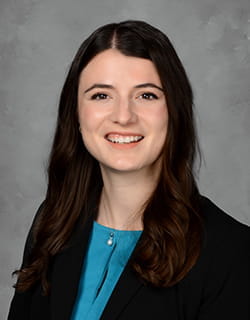 Why did you choose the Health Promotion and Disease Prevention Scholarly Concentration?
Why did you choose the Health Promotion and Disease Prevention Scholarly Concentration?
I am really interested in family medicine. And with that, I'm really interested in preventative medicine — sort of the true primary care where you keep people from getting sick, and then you try to keep them healthy. My big interest within medicine is preventative care. So I saw that the Health Promotion and Disease Prevention Scholarly Concentration fit that to a tee. It’s certainly not limited to people going into primary care, but it’s pretty perfect for those going into primary care.
What scholarly project have you chosen to undertake and why?
For my project, I'm doing a video-based intervention trying to tackle food insecurity. What we've done is work with food pantries to come up with a list of foods that are commonly stocked at those food pantries, and then using that curated list, we develop nutritious recipes that people can make using more limited food options or pantry basics.
Then we make cooking videos on how to make those recipes and upload them to YouTube – and all of that is freely accessible. The ideal audience we're trying to reach is food-insecure individuals, particularly families who are food insecure. But it's a really neat project and I've really loved doing it.
How has your work with your Scholarly Concentration come up in residency interviews?
It has come up in every single residency interview I’ve had! It is usually brought up in response to research, community service, passion within medicine, or as an example of taking initiative or filling a need. Every person who has asked has expressed how impressed they are with the project. Several of them have actually asked for the YouTube channel link and have become a subscriber. One had already made a recipe from my video before the interview!
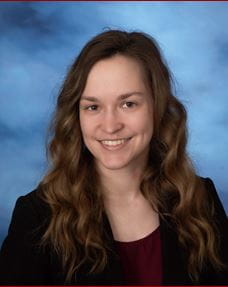 Why did you choose to participate in the Health Promotion and Disease Prevention Scholarly Concentration program?
Why did you choose to participate in the Health Promotion and Disease Prevention Scholarly Concentration program?
I chose to participate in the Health Promotion and Disease Prevention Scholarly Concentration program because I am passionate about family medicine and helping people with their health goals. The best way to help individuals better their health is to promote healthy life choices in order to prevent major diseases.
How will your participation in this scholarly concentration contribute to your overall career aspirations in medicine?
Doing research into an area of health promotion for the State of Indiana has helped me become more in tune with the needs of my community. I will most likely end up doing some sort of research in my future career, so this project will help me hone those skills to use as a family medicine physician.
It has been an honor and privilege working with the IUSM-Muncie students on the survey about MAT (medication-assisted treatment). The Delaware County IRACS team shared the survey with individuals who are incarcerated and there were lots of different answers… Thank you for helping us to present the surveys in hopes of future change in our communities and those with SUD (substance use disorder).
Scholarly Concentration students exhibit excitement at the prospect of additional learning opportunities. I enjoy watching them turn an idea in an area of interest into a research concept that will teach them how to appropriately investigate a question and make it pertinent to the eventual improvement in patient outcomes. In our concentration, we’re able to educate them on the benefits of working personally with individuals or communities to promote positive health choices and prevent illness by challenging the status quo for scholarly insight and unbiased investigation.
Human Sexuality and Health
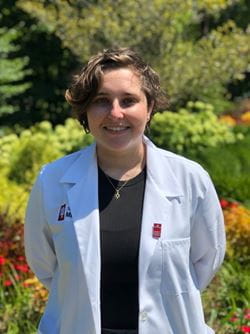
How will your participation in the Human Sexuality and Health Scholarly Concentration contribute to your overall career aspirations in medicine?
I think the scholarly concentration will make me a better physician regardless of what field I go into, because I believe the clinical practices we use to improve health care for LGBTQ+ patients can be applied to improve health care for all patients. I also know that no matter what field I practice in, I will have patients who identify as LGBTQ+, and I want to make it easier for these patients to access health care and feel safe and comfortable doing so.
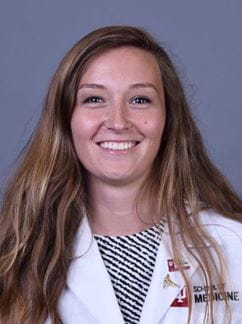 What was the inspiration for your scholarly project?
What was the inspiration for your scholarly project?
I realized there was a large gap in LGBTQIA+ education and exposure while in medical training, and I wanted to figure out how this influenced medical students’ knowledge and attitudes towards the LGBTQIA+ community and LGBTQIA+ health. My hope was to find intervention points in which medical training could be improved to ensure that our future physicians provide affirming care for folks of all sexual orientations and gender identities. I sent a survey to people who identify as LGBTQUIA+ living in southern Indiana. These data have been really enlightening, and we are now using it to guide efforts to open a free, student-run clinic for the LGBTQIA+ community.
Medical Education
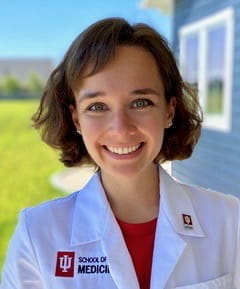 Why did you choose to participate in the Medical Education Scholarly Concentration program?
Why did you choose to participate in the Medical Education Scholarly Concentration program?
I came into medical school knowing that I wanted to incorporate medical education into my future career as a physician. The scholarly concentration is actually one of the factors that influenced my decision to come to IU School of Medicine.
How will your participation in this scholarly concentration contribute to your overall career aspirations in medicine?
My participation in this concentration has only made me more certain of my desire to go into academic medicine and medical education. Between the courses, interactions with the faculty, and every experience I have had thus far with my project, the concentration has truly enriched my education and helped me to see where my future place in medicine might be.
Medical Humanities
Why did you choose to participate in the Medical Humanities Scholarly Concentration program?
The Medical Humanities scholarly concentration was one of the best decisions I've made for myself in medical school. It allows scholarly engagement, discussion of complex topics, and maintenance of wellness through engaging in a side of medicine that is highly important but often neglected in medical education. I highly recommend the experience to anyone else who is interested.
Public Health
Why did you choose the concentration you’re a part of?
I chose the Public Health concentration because I am passionate about addressing health disparities and improving population health outcomes. This concentration offers me the opportunity to focus on prevention, health promotion, and policymaking, which all align with my desire to create lasting change on a broader scale.
How will your participation in this program contribute to your overall career aspirations?
The Public Health concentration will equip me with the skills and knowledge to tackle large-scale health challenges and address the root causes of health inequities as a physician. This program has helped me gain experience in data analysis, health policy, and community-based interventions, all of which are essential to my goal of pursuing a career in public health leadership. By understanding how to implement effective prevention strategies and advocate for policy changes, I will be better prepared to influence healthcare systems and improve health outcomes on a population level.
How has this program shaped your medical school journey?
The Public Health concentration has significantly shaped my medical school journey by broadening my perspective on healthcare beyond individual patient care. It has deepened my understanding of the social, environmental, and policy factors that impact health, encouraging me to think critically about how to address health inequities. This program has also provided me with valuable research and practical experiences in public health, which have enriched my clinical training and helped me approach medicine with a more holistic, community-centered mindset.Why did you choose the concentration you’re a part of?
Before medical school, I taught as a high school teacher in Chicago. Education has always been a large part of what drew me to medicine because of how essential it is to promoting health equity. I chose the Public Health Scholarly Concentration because of its emphasis on education and the many other domains that contribute to accessible healthcare.
How will your participation in this program contribute to your overall career aspirations?
Participating in this program has reinforced my desire to integrate public health work into my career. This program has helped me to better understand the different ways to accomplish this goal, whether through research, policy advocacy, or by partnering with community-based initiatives. This program has also strengthened my desire to go into primary care, as I hope to become a pediatrician.
How has this program shaped your medical school journey?
Being on clinical rotations now has been an eye-opening experience. It's one thing to read about barriers to care, but it's entirely different to see them play out in conversations with real patients in the Indianapolis community. This program has encouraged me to view patients more holistically and to ask questions to better advocate for them.
This program has also enabled me to build great relationships with IUSM faculty. I've been incredibly lucky to work with mentors who have encouraged me to pursue a project that interests me. They've offered great guidance while also allowing me to lead the project.
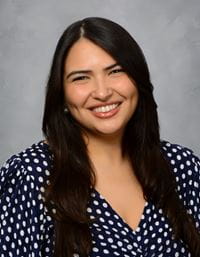 How do you expect your experience in this scholarly concentration to contribute to your career path in medicine?
How do you expect your experience in this scholarly concentration to contribute to your career path in medicine?
The Scholarly Concentration Program connected me with incredible mentors and peers that are passionate about my specific interest in public health. The curriculum was interesting, and I enjoyed the opportunity to conduct research with the support and guidance of faculty.
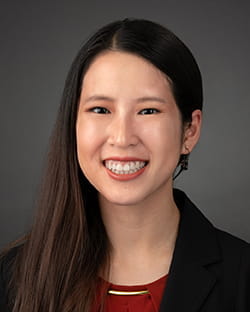 Why did you choose the Public Health Scholarly Concentration?
Why did you choose the Public Health Scholarly Concentration?
I've always been really interested in not just the biological basis behind illness, but the social reasons behind why people get sick. My health care goal eventually is to work on increasing health equity, especially amongst racial minorities, and to reduce barriers to care. So I thought that the Public Health Scholarly Concentration would be the most practical way to go about that. I have very little public health training, and it was just something that I've always been interested in. So I figured it would be good to just learn more about public health.
How has participating in the Public Health Scholarly Concentration shaped your medical school journey?
I think it's helped me view patients much more holistically. I think it's really easy, especially when you have a huge patient load, to just say “well, you have this disease, we're going to treat it and move on.” I think, ultimately, I just have more grace for patients when they have non-compliance issues. It’s helped me become more analytical, not just looking at the biological basis behind the disease; there are so many other things to look out for.
It's also given me a greater appreciation for primary care. I thought I was going to work at the hospital all the time, but seeing that if you have a good public health system you can have all these ways to prevent illness. Having a good public health system is so crucial to care and thinking more broadly about why patients are sick instead of just “oh, they have this disease.”
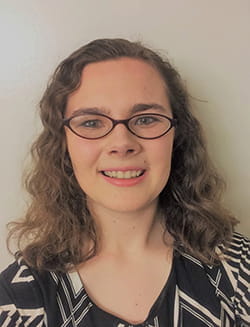 Why did you choose the Public Health Scholarly Concentration?
Why did you choose the Public Health Scholarly Concentration?
Public Health stood out as a Scholarly Concentration because of my concurrent interest in pursuing the Master of Public Health (MPH) to further my knowledge of the realm of public health. The Scholarly Concentration really served as a stepping stone for these interests of mine, particularly epidemiology, and how these different principles apply to the field I'm interested in pursuing in medicine, which is Ophthalmology.
How has participating in the Public Health Scholarly Concentration shaped your medical school journey?
It has served as a starting point for my journey within public health. It's been great that there's overlap with the MPH program as far as how credits count; it's helped me complete some of the foundational classes for the MPH that I’m pursuing in epidemiology to make this pathway more smooth.
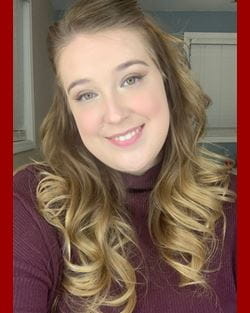 “Being in the Public Health Scholarly Concentration program has provided me with invaluable interdisciplinary education. From learning basic introduction to public health to the overview of healthcare systems in America, I know I will carry this knowledge forward with me to provide better care for and with my patients."
“Being in the Public Health Scholarly Concentration program has provided me with invaluable interdisciplinary education. From learning basic introduction to public health to the overview of healthcare systems in America, I know I will carry this knowledge forward with me to provide better care for and with my patients."
What have you learned through working on your scholarly project?
It was an opportunity to learn more about scholarship. As a person who had never been involved in academic writing, this concentration has provided me with opportunities to learn about this process so I am comfortable doing it in the future.
Quality and Innovation in Health Care
 "Having the opportunity to work with doctors and other health care professionals who have taken up additional quality improvement roles within their hospital systems has provided me with a better understanding of how I can pursue quality innovation in health care as a medical professional."
"Having the opportunity to work with doctors and other health care professionals who have taken up additional quality improvement roles within their hospital systems has provided me with a better understanding of how I can pursue quality innovation in health care as a medical professional."
Why did you choose the Quality and Innovation in Health Care scholarly concentration?
I was very interested in further exploring how, through quality improvement measures, we can work to better the institutions we will one day work for, with the hopes of improving patient health outcomes as well as the overall work environment of the facility.
What are you learning through work on your scholarly project?
An end goal of the study I am conducting is to discuss how adoption of artificial intelligence (AI) technology into our current electronic health records can help augment physician practices in ways to ensure they are providing the most up-to-date, evidence-based medicine to best improve patient health outcomes within their community.
How do you expect your experience in this scholarly concentration to help guide your career path?
With internal medical departments developing quality improvement teams, I know I will be prepared to fill a leadership role with the experience and educational certification I gained through this program. I have always had professional aspirations of one day becoming a doctor, but now I have a clearer focus on what institutional role I want to play as a doctor in the improvement of my patients’ health outcomes.
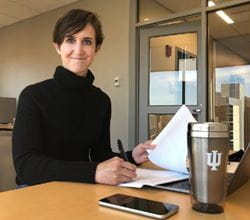 "I am really interested in doing research that directly impacts patients. Clinical research seems to have more of a human side to it."
"I am really interested in doing research that directly impacts patients. Clinical research seems to have more of a human side to it."
What have you learned through working on your scholarly project?
We were looking at re-admission rates for congestive heart failure patients based on whether they followed up at a post-discharge clinic in Evansville. We thought the clinic was helping, and we were able to find out by how much. Our team presented at the American College of Physicians Indiana chapter meeting and won first place there! This gave us the opportunity to present at the national conference, which was held virtually. It was a valuable learning experience!
Religion and Spirituality in Medicine
Why did you choose the concentration you’re a part of?
I chose the Religion and Spirituality Scholarly Concentration because I wanted to grow in my ability to understand patients as people not as someone with a disease or puzzle to be solved. I was excited to have conversations about deep topics with my peers and learn about research methods around taking spiritual histories and projects revolving around religion and spirituality.
How will your participation in this program contribute to your overall career aspirations?
Although I am not set on a medical path yet, I can use the skills from this program in all areas of medicine. Every field of patient care will encounter spiritual needs to be addressed and all physicians should be prepared for those conversations and know how to partner with chaplains and other resources to care for patients.
How has this program shaped your medical school journey?
This program has allowed me to connect with physicians, chaplains, researchers, and students who deeply care about the interplays of spirituality and health and seek to see patients as whole persons. I truly feel that I will be a better physician because of skills I developed in this concentration.
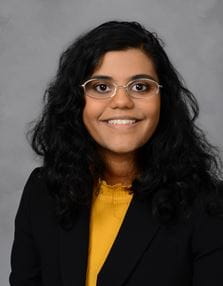 How do you expect your experience in this scholarly concentration to contribute to your career path in medicine?
How do you expect your experience in this scholarly concentration to contribute to your career path in medicine?
The Religion and Spirituality Scholarly Concentration gave me the opportunity to think deeply about empathy, connecting with other individuals, and reconciling the empirical nature of clinical research with the humanitarian nature of clinical practice. My project was particularly meaningful, in studying breast cancer survivorship, clinical psychology, and spirituality - these themes have been important to my own family with my mom's journey with breast cancer. My mentorship team brought in a unique sent of individuals who graciously and generously brought me into their worlds of expertise, and I am thankful to have done this program.
Rural Health
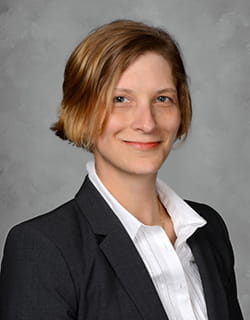 How has your work with your Scholarly Concentration come up in residency interviews?
How has your work with your Scholarly Concentration come up in residency interviews?
I'm pretty early in the interview season right now for applying to residency, but I've talked about this project in most of my residency interviews so far. The Scholarly Concentrations Program augments the curriculum along the way and then gives students some advantages. for residency applications as well. It’s given me some depth to have this research experience along with my clinical experiences, service, work and leadership.
What scholarly project have you chosen to undertake and why?
I did a survey of patients coming to three rural clinics in Western Indiana to learn more about what they know of carbon monoxide poisoning and behaviors that can affect their chances of encountering carbon monoxide. Essentially, I gave them a test asking what they know about carbon monoxide and which behaviors are safe and which are not. I also asked some other questions about their general experiences with carbon monoxide.
This came about through a resolution that a colleague and I wrote for the Indiana State Medical Association after one of our professors told us a story about his childhood teacher who passed away from carbon monoxide poisoning. She was a beloved member of the community, and that really touched me and my colleague. We started looking into carbon monoxide laws in the state of Indiana and the prevalence of carbon monoxide poisoning. What we learned was that for its population, the Midwest generally has a disproportionate number of non-fire-related, unintentional carbon monoxide poisonings compared to the rest of the United States. So I really wanted to learn more about why that might be. I chose to look at rural areas because research shows that, in general across the world, carbon monoxide poisoning seems more frequent in rural areas due to using fuel burning to heat the home and cook and such.
I really wanted to learn more about what people knew about carbon monoxide poisoning in rural areas in Indiana and what they knew about how to protect themselves, so maybe we could think about more targeted public health campaigns and being able to protect our community members a little bit better.
 Why did you choose the Rural Health Scholarly Concentration?
Why did you choose the Rural Health Scholarly Concentration?
I grew up in a rural town in East-Central Illinois, where if you really needed any kind of specialty care, you had to travel outside of our town. So I went into Rural Health because I would like to be able to reach out to rural communities that don't really have access to a lot, outside of a couple of family medicine doctors or just very basic primary care, and be able to offer specialized care – or to offer care in general to areas that might be hurting in terms of not having a whole lot of providers in the area.
How has participating in the Rural Health Scholarly Concentration shaped your medical school journey?
With the Scholarly Concentrations Program, we have some generalized classes that everyone takes in public health and things like that. So it's given me a little bit more exposure to public health courses and a wider knowledge of public health and how that affects the public in general, without having to go through and do an extra full year of a Master's in Public Health. It’s shown how public health kind of melds into this idea of rural health and how rural health is important and has been affected over the past several years by a growing deficit of physicians in rural areas.
Outside of that, I'm also in the Rural Medical Education program, which has allowed me to spend my clinical years in Terre Haute. I've been able to do a lot more hands-on stuff in Terre Haute where it's just been me and the physician; there haven’t been any other medical students or residents or fellows or anything like that. So I've been able to get a lot of hands-on experience and exposure to health care in some more rural areas that surround Terre Haute as well.
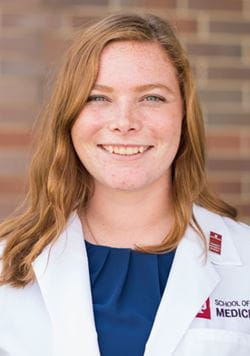 "The rural medicine education program and the scholarly concentration have strengthened my desire to serve those in my small community and have afforded me the skills to be able to do so with confidence and greater knowledge of the needs around me. It is preparing me to come home and care for those who took such good care of me."
"The rural medicine education program and the scholarly concentration have strengthened my desire to serve those in my small community and have afforded me the skills to be able to do so with confidence and greater knowledge of the needs around me. It is preparing me to come home and care for those who took such good care of me."
Why did you choose the Rural Health scholarly concentration?
I grew up on a farm in north central Indiana. This scholarly concentration has allowed me to return home for research, connect and network with medical professionals in my community, and further educate me on the needs and challenges of rural medicine.
What scholarly project have you chosen to undertake, and why?
I am examining the motivations behind choosing midwifery services and community births (home and birthing center births, or out-of-hospital births). In many rural areas, women’s health and obstetric care is directed by midwives. However, much of the research behind the motivations for choosing midwifery come from urban populations. When I got a chance to shadow a midwife after my first year of medical school, I jumped on it. I became interested in learning more about midwifery, the motivations behind choosing community birth, the integration of midwives and obstetricians, and the risks and benefits that come with it. I am very excited for the chance to further explore midwifery in rural areas and why these women are choosing it over the now “traditional” obstetrics hospital-based model.
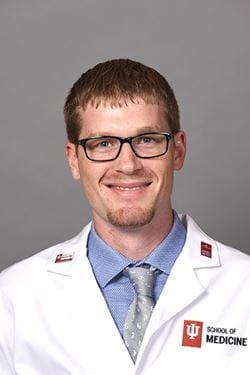 "Working in rural medicine gives you the opportunity to think outside of the box and come up with care plans that can be tailored to widely different people. I feel the Rural Health scholarly concentration has taught me how to handle many of these situations while moving forward in my career."
"Working in rural medicine gives you the opportunity to think outside of the box and come up with care plans that can be tailored to widely different people. I feel the Rural Health scholarly concentration has taught me how to handle many of these situations while moving forward in my career."
Why did you choose the Rural Health scholarly concentration?
I chose the Rural Health program because it gives me an opportunity to learn more about how the health care system works in a small town. Working in rural medicine presents unique challenges. For example, you have to be able to recognize organophosphate poisoning (agricultural workers are at higher risk) and how to react to the situation without putting more people in harm’s way. You also have to be prepared to take care of someone who is unable to get to the nearest city with the appropriate level of care due to inability to travel. With this scholarly concentration, I was given the chance to learn more about rural medicine and how to handle many of these situations.
Describe the scholarly project you’ve chosen and the inspiration behind this project.
I am doing a project with two of my rural concentration classmates studying how COVID-19 has affected actions taken by people in rural communities. We are focusing on the rural-versus-urban differences in knowledge and actions, and how differences in funding affect those two things. Obviously, COVID-19 has affected everyone in the world in one form or another, so I wanted to understand the different actions each community took to protect themselves from the virus. I believe that differences in these actions can shed some light on public health outreach relating to rural ideologies.
Urban Medicine and Health Care Disparities
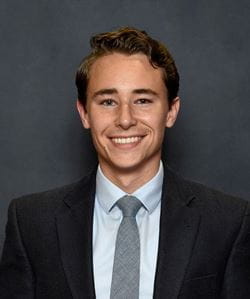 Why did you choose to participate in the Urban Medicine and Health Care Disparities Scholarly Concentration, and how do you expect your participation to help guide your career in medicine?
Why did you choose to participate in the Urban Medicine and Health Care Disparities Scholarly Concentration, and how do you expect your participation to help guide your career in medicine?
Studying medicine at the Gary campus comes with a unique opportunity to integrate economics, sociology, politics, health care, science and a variety of other disciplines into medical education. The Urban Medicine and Health Care Disparities Scholarly Concentration program helped me consider how a patient's environment and circumstances affect their health and why they may develop a given condition before presenting to the doctor. My participation in this scholarly concentration has given me a deeper appreciation for public health and the value of preventing illness before needing to treat it.
What scholarly project have you chosen to undertake, and why?
We did a project with a local organization that's called Operation Combat Bikesaver – a nonprofit organization that tries to do what they call “Hot Rod therapy.” They work with veterans, and they basically offer this healthy outlet for them to come and build motorcycles. And then through that, they also offer more formal connections to healthcare and psychiatric care as well as peer support groups.
So we did a research study with them sort of as a community-based participatory research study to analyze and review the effects that this program has had on veterans in the Northwest–Gary area. That project was important to me because I'm in the Air Force, so I'm doing the Health Professions Scholarship Program. What I wanted to do, since I'm sort of removed from that patient population right now, was get exposure to and learn better ways to help that population while I'm in medical school and still learning.
How has participating in the Urban Medicine and Health Care Disparities Scholarly Concentration shaped your medical school journey?
It's definitely given me a broader understanding of all the other things patients face before they can actually address just really baseline medical needs. A lot of the Scholarly Concentration focuses on psychiatric care and barriers to care, so it’s shaped the way I think about the patient experience between the patient being in the office or in the hospital and at home. What it takes for them to go from at home to in the hospital or in the office were things I just really hadn't considered as much, so the Concentration helped my understanding of what are the barriers to care for various patients.
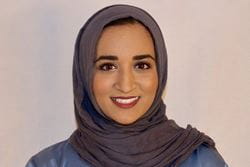 Why did you choose to participate in the Urban Medicine and Health Care Disparities Scholarly Concentration program?
Why did you choose to participate in the Urban Medicine and Health Care Disparities Scholarly Concentration program?
As a Muslim woman of color born to refugee and immigrant parents, serving minority communities that are disproportionately impacted by health inequity has always been a priority of mine. The Urban Medicine and Health Care Disparities Scholarly Concentration at IU School of Medicine-Northwest-Gary offered an unparalleled pathway to gain greater understanding of health disparities in an urban setting through research and clinical experiences with the diverse patient population I hope to serve in the future.
How will your participation in this scholarly concentration contribute to your overall career aspirations in medicine?
Participating in the Urban Medicine and Health Care Disparities Scholarly Concentration has helped develop my independent research skills and has vastly expanded my knowledge of public health and patient-centered, community-based health initiatives. As an aspiring emergency medicine physician, these areas of knowledge are critical as emergency departments often serve the primary care needs of underserved communities.